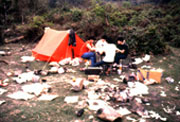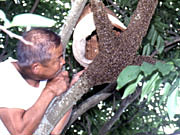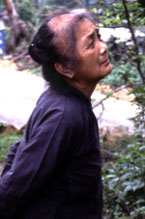
Tai Long Wan -- Tales from a vanishing village
by Keith Addison
Tai Long Wan village, Shek Pik, Lantau, Hong Kong, 1983-85
|
Stories by Keith Addison |
| Tai Long Wan -- Tales from a vanishing village Introduction |
|
Tea money |
|
Back to basics |
|
Forbidden fruit |
|
A place where nothing happens |
|
No sugar |
|
Treasure in a bowl of porridge |
|
Hong Kong and Southeast Asia -- Journalist follows his nose |
| Nutrient Starved Soils Lead To Nutrient Starved People |
|
Cecil Rajendra A Third World Poet and His Works |
|
Leave the farmers alone Book review of "Indigenous Agricultural Revolution -- Ecology and Food Production in West Africa", by Paul Richards |
|
A timeless art Some of the finest objects ever made |
|
Health hazards dog progress in electronics sector The dark side of electronics -- what happens to the health of workers on the production line |
|
Mo man tai ('No problem') -- "Write whatever you like" -- a weekly column in Hong Kong Life magazine Oct. 1994-Jan. 1996 |
|
Swag bag Death of a Toyota |
|
Zebra Crossing -- On the wrong side of South Africa's racial divide.
|
|
Curriculum Vitae |
|
|
It was a blazing hot Saturday, just before sunset. I was servicing my motorbike on the porch in front of the house when two youths, obviously from the city, stopped beneath an old custard apple tree overhanging the path nearby.
___One of them leapt up and grabbed at a big custard apple, still too green to eat, but he missed and tore off part of a branch instead.
___"Hey, take it easy," I called out, cautious in case the tree turned out to belong to his grandfather -- we two village foreigners didn't know all the children of the valley who lived in the city now, spending only the occasional weekend in the village.
___ "What?" one of the youths responded, as the other leapt up again, succeeding this time in plucking the fruit.
___ "Are you camping on the beach?" I asked.
___ "Yes," the lad said. Strangers after all. I'd have stopped them if I'd known -- and saved them a lot of trouble, as it turned out.
 City kids celebrating the joys of nature at Tai Long Wan |
___ The villagers suffered constant losses from city kids who came to camp on the beach and often raided the orchards, stealing fruit and damaging fences and trees.
___ All exits to the orchards and cropfields from the public path leading to the beach bore signs in Chinese saying such things as "Tourists -- stop!" and "Keep out -- trespassers will be fined $1,000 or given a big smash!" But the raiders struck late at night and were seldom caught.
___ But this was broad daylight. The Widow Fung, returning late from the fields carrying her hoe over her shoulder, had also seen what had happened and she hastened forward to stop the thieves, but the two lads made off.
___ Her piercing yells attracted other villagers, and some of the visiting village youngsters chased after the two youths and brought them back.
___ "How dare you steal our fruit?" the Widow Fung demanded.
___ "We didn't know," one lad said. The other, still holding the custard apple, pointed at me and said: "The gweilo said we could take it."
___ "Don't tell lies!" the old woman shouted angrily. The dismayed youths shrank back.
___ "Who's tree is it?" asked Ah Fung the Shopkeeper.
___ "Fung Pak's," said the Widow Fung -- our landlord's, Grandfather Fung.
___ Two of the children ran off to call Fung Pak, but the old man was eating his dinner and told them to keep the two youths there at the vandalized tree until he was finished, which they did with glee -- it's a real treat for 10-year-olds to be put in charge of 18-year-olds. The youths accepted this humiliation with poor grace.
___ I went on working on my bike.
___ Eventually Fung Pak emerged from his house at the end of the row and ambled through the village to confront the wrongdoers.
___ "Why did you steal my fruit?" he asked.
___ "We didn't know," pleaded one, while the other, still holding the fruit, said again: "The gweilo said we could."
___ "Nonsense!" old Fung told him. "You knew it wasn't yours," he told the other. There was no reply.
 Fung Pak nets a swarm of wild bees in his tree |
___ "Why so much?" they protested. "For one fruit!"
___ "If you buy it, the price is one dollar. If you steal it, one hundred dollars. That is the rule."
___ "But we haven't got one hundred dollars!" they argued.
___ "Then you will come with me." He took the youth holding the fruit by the wrist and marched him off towards his house. The lad tried to twist free but the old farmer was much the stronger. His captive squirmed and complained, until the old man turned and bellowed at him like an angry bull, bringing immediate submission.
___ All the villagers in the top row were sitting on their porches or on the benches opposite the houses watching, and they berated the youth as the strange duo passed by.
 Mrs Fung the Mother of 12 |
___ The other youth meanwhile ran down the path to the beach and soon returned with the rest of the group, six youngsters. Ignoring the villagers' derisive comments, they marched to where Fung Pak was sitting on his porch waiting for them, still holding the unhappy thief by the wrist.
___ I wondered whether the old man would need help as they crowded onto the porch, blustering and shouting, pressing in upon him, waving their arms threateningly. But he picked up a hammer and swung it over his head, roaring ferociously. The campers fled -- except for the thief, who didn't dare move.
___ Waving the others back, the group leader gingerly approached the porch and began arguing the case. Sitting with Mrs Fung the Shopkeeper's Wife at the other end of the row, I couldn't hear what was being said, but I kept hearing the word "gweilo", so I stepped up to settle that line of argument.
___ "Is your friend still saying I told him he could take the fruit?" I asked the leader. "Why doesn't he stop lying and admit he was wrong?"
___ "Yes, he was wrong," the leader decided. "But $100 is too much, he hasn't got $100, he is only a student."
___ "Student!" Fung Pak snorted. "Why is he so stupid then?"
___ This brought peels of laughter from the villagers.
___ "Well, he must pay," I said.
___ "But he is a student, he has no money!"
___ "Mr Fung is a farmer, he has even less money," I said, with loud agreement from the villagers, "and your friend has stolen his fruit."
___ "But it is too much..."
___ "He can pay, or Mr Fung will call the police and he will be arrested for theft," I said.
___ "That's right," said Fung Pak. "I'll put him in handcuffs." He pointed to an awful-looking steel hook affair lying on the table, vaguely resembling a handcuff. The culprit wilted visibly. I'd seldom seen anyone wearing such an obstinate expression as old Fung's. Meanwhile Mrs Fung the Mother of 12 was telling the other campers what she thought of them. She was really good at that (as I knew well!) -- they kept wincing, their bravado steadily sagging.
___ "I'm sure his friends will help him pay," I suggested to the group leader, and turned to go, nodding to Fung Pak -- who gave me a mischievous grin that no one else saw. He wasn't really angry at all, it was just a sham.
___ The villagers kept on making rude remarks at the group of campers standing nearby, who didn't respond, but they were smarting.
___ In fact the custard apple was just an excuse to cause a bunch of city kids serious loss of face, as well as teach them a lesson. Yet these old villagers were about the most placid people you could wish to meet, why were they being so vengeful?
___ Their patience had simply run out, long ago already. It wasn't just the fruit. One night visiting kids had set up camp -- four tents and a barbecue -- in one old woman's peanut field, where she found them the next morning, the field flattened and the crop destroyed, and when she complained they jeered at her.
___ Another group set fire to some grass, and the fire swept through four fields, a patch of bananas and two bamboo thickets before the farmers could put it out. There was a long list of such incidents.
___ The really stupid part of it was that the city kids weren't even supposed to be there. Camping on beaches was illegal, excepting in designated camping areas in a country park, and this beach was neither -- the country park boundary followed the Water Department road well above the village, the valley and the beach.
___ This hadn't stopped the Country Parks Division featuring the valley and the beach in the cover photograph of a leaflet on the country park handed out to all comers at the Mui Wo ferry pier.
___ "Why did you put that photograph on the cover?" I once asked them. "It isn't in the Country Park."
___ "But it's a nice photograph," was the reply.
___ So the campers kept coming.
___ Most villagers went to bed early, getting up at 6 am to start another hard day, and outsiders were banned in the village after 10 pm, but groups of campers often arrived at 2 or 3 am, up to 20 young people heavily armed with barbecue forks and pretending not to be terrified of the dark, shouting loudly, flashing their torches everywhere and using multiple industrial-strength portable stereos to frighten off all the evil spirits.
___ The men were often called from the fields, or from their beds, to keep control. They'd each take a five-foot length of one-inch-thick steel waterpipe and set off in strength to force a group of campers to pay for the damage they'd caused, or to evict them from the valley. They'd often asked me to join them. They never hurt anyone though.
___ Most city youngsters thought the old farmers were uneducated, primitive, ignorant old fools and treated them like dirt. A jeering bunch of city kids shouting "Monkey! Monkey!" had once thrown stones at Mrs Fung the Mother of 12 as she worked in one of her fields.
___ Now the villagers were getting their own back.
___ The counsel for the defence was making no impression on the judge and jury. "If he can't pay, he can stay here until he starves," old Fung growled.
___ In fact he could pay -- the money was in his pocket all the time, and somehow the old man knew it. When their resistance finally collapsed, the lad paid up without any help from his friends, and Fung Pak let him go. He even let him keep the custard apple.
___ Sullen and resentful, the humiliated youths slunk out of the village and back to their camp on the beach. The villagers watched them go in silence.
___ At sunset, laden with rucksacks and barbecue forks, their stereos silent, they trailed back through the village and out of the valley on their way to the bus stop. They wouldn't be back. Nor would any of their friends.
___ A few days later Fung Pak started clearing the heavy growth of weeds from under the custard apple tree, and the orange tree and two small lychees growing beyond it. He dug up all the weeds and banked rocks around the trees to hold more soil.
___ "Too much work," he told me, taking a rest under the orange tree. "And no use here next to the path -- people will just steal the fruit."
___ "No, no," I said, "you'll be a rich man." I began counting off the little green oranges on the tree: "$100, $200, $300..."
___ He slapped his thigh and bellowed with laughter.











